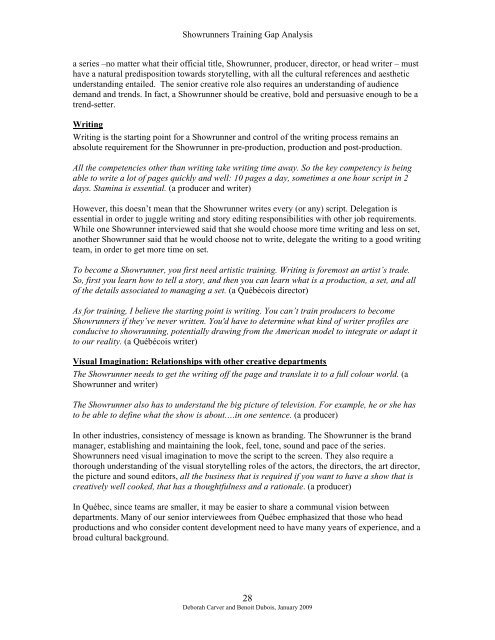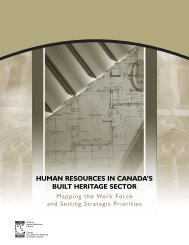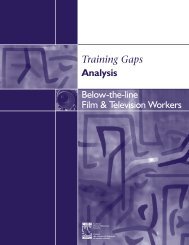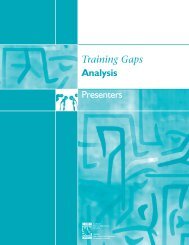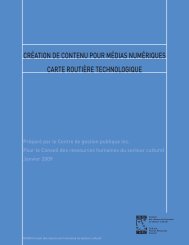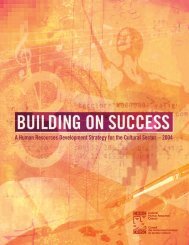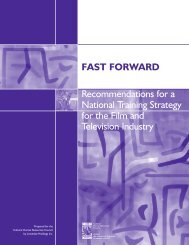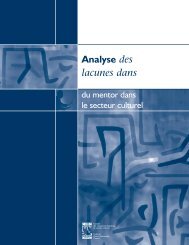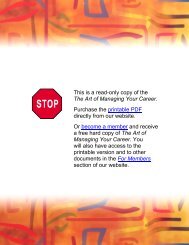Showrunners - Training Gaps Analysis - Cultural Human Resources ...
Showrunners - Training Gaps Analysis - Cultural Human Resources ...
Showrunners - Training Gaps Analysis - Cultural Human Resources ...
Create successful ePaper yourself
Turn your PDF publications into a flip-book with our unique Google optimized e-Paper software.
<strong>Showrunners</strong> <strong>Training</strong> Gap <strong>Analysis</strong><br />
a series –no matter what their official title, Showrunner, producer, director, or head writer – must<br />
have a natural predisposition towards storytelling, with all the cultural references and aesthetic<br />
understanding entailed. The senior creative role also requires an understanding of audience<br />
demand and trends. In fact, a Showrunner should be creative, bold and persuasive enough to be a<br />
trend-setter.<br />
Writing<br />
Writing is the starting point for a Showrunner and control of the writing process remains an<br />
absolute requirement for the Showrunner in pre-production, production and post-production.<br />
All the competencies other than writing take writing time away. So the key competency is being<br />
able to write a lot of pages quickly and well: 10 pages a day, sometimes a one hour script in 2<br />
days. Stamina is essential. (a producer and writer)<br />
However, this doesn’t mean that the Showrunner writes every (or any) script. Delegation is<br />
essential in order to juggle writing and story editing responsibilities with other job requirements.<br />
While one Showrunner interviewed said that she would choose more time writing and less on set,<br />
another Showrunner said that he would choose not to write, delegate the writing to a good writing<br />
team, in order to get more time on set.<br />
To become a Showrunner, you first need artistic training. Writing is foremost an artist’s trade.<br />
So, first you learn how to tell a story, and then you can learn what is a production, a set, and all<br />
of the details associated to managing a set. (a Québécois director)<br />
As for training, I believe the starting point is writing. You can’t train producers to become<br />
<strong>Showrunners</strong> if they’ve never written. You'd have to determine what kind of writer profiles are<br />
conducive to showrunning, potentially drawing from the American model to integrate or adapt it<br />
to our reality. (a Québécois writer)<br />
Visual Imagination: Relationships with other creative departments<br />
The Showrunner needs to get the writing off the page and translate it to a full colour world. (a<br />
Showrunner and writer)<br />
The Showrunner also has to understand the big picture of television. For example, he or she has<br />
to be able to define what the show is about….in one sentence. (a producer)<br />
In other industries, consistency of message is known as branding. The Showrunner is the brand<br />
manager, establishing and maintaining the look, feel, tone, sound and pace of the series.<br />
<strong>Showrunners</strong> need visual imagination to move the script to the screen. They also require a<br />
thorough understanding of the visual storytelling roles of the actors, the directors, the art director,<br />
the picture and sound editors, all the business that is required if you want to have a show that is<br />
creatively well cooked, that has a thoughtfulness and a rationale. (a producer)<br />
In Québec, since teams are smaller, it may be easier to share a communal vision between<br />
departments. Many of our senior interviewees from Québec emphasized that those who head<br />
productions and who consider content development need to have many years of experience, and a<br />
broad cultural background.<br />
28<br />
Deborah Carver and Benoit Dubois, January 2009


